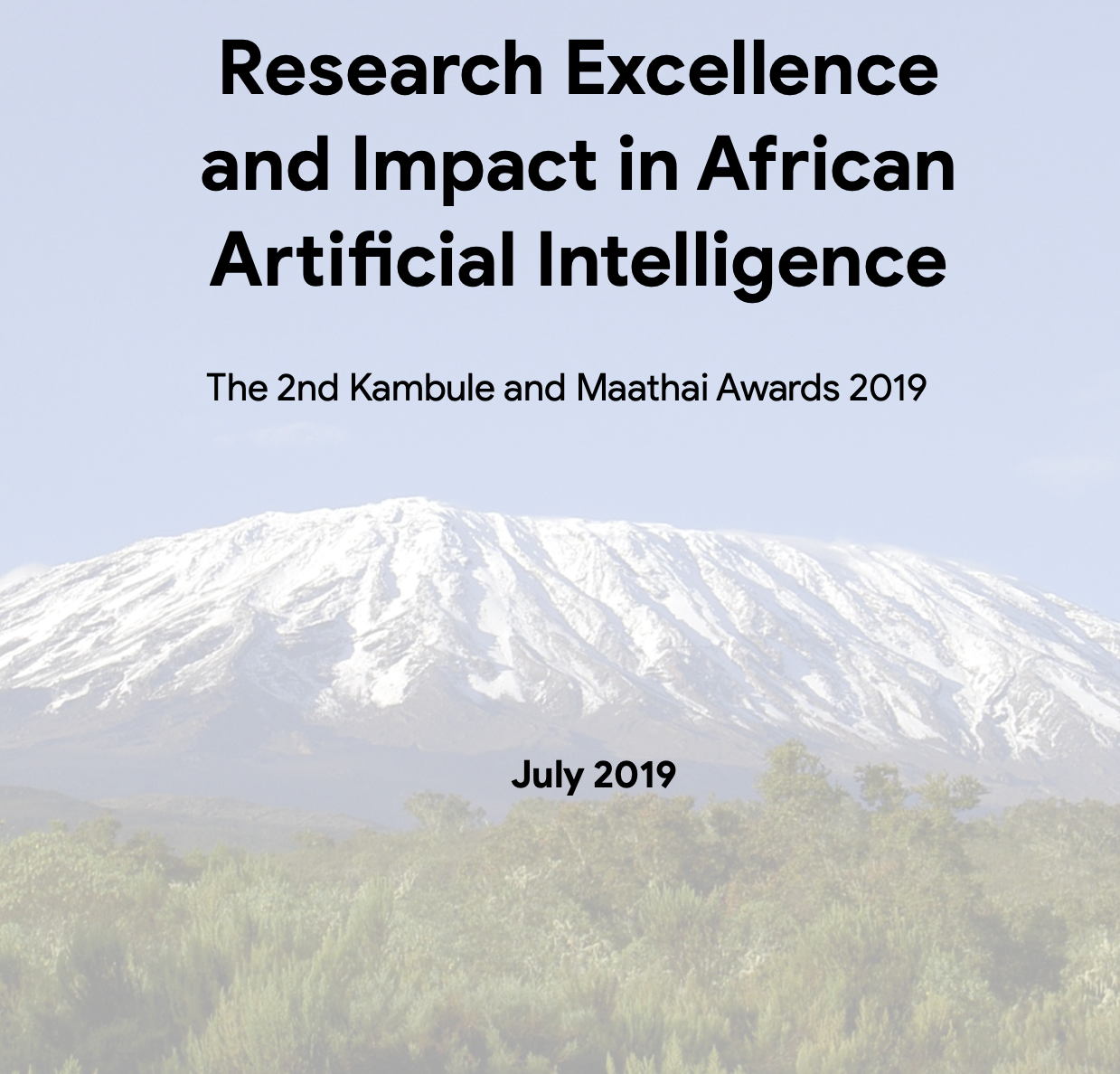Today we are proud to announce the winners of the three Indaba Awards: the Kambule Doctoral Award, Kambule Masters Award, and Maathai Impact Award. These awards recognise and celebrate African excellence in machine learning and artificial intelligence. We also release our report summarising the outcomes of this programme and share its key recommendations.

Kambule Doctoral Award
The Kambule Doctoral Award recognises and encourages excellence in research and writing by doctoral candidates at African universities, in any area of computational and statistical sciences, and whose work demonstrates excellence through technical rigour, significance of contribution, and a strong role in strengthening African machine learning. The Kambule Doctoral Award celebrates African research excellence: its recipients are those that uphold Thamsanqa Kambule’s legacy as a defender of learning, a seeker of knowledge, and activist for equality.
It is with the greatest pleasure that we award the 2019 Kambule Doctoral Award to Dr Marcellin Atemkeng.
Marcellin is awarded the Kambule Doctoral Award for his thesis which advances the state of knowledge in low-loss data compression methods for radio interferometric data, with application to the Square Kilometre Array, and our quest for a better understanding of our universe.
Atemkeng, M.T. (2016). Data Compression, Field of Interest Shaping and Fast Algorithms for Direction-dependent Deconvolution in Radio Interferometry. PhD thesis, Rhodes University, South Africa.
Marcellin will be hosted at the University of Oxford, through the generous sponsorship of the Africa Oxford Initiative, to present his work.
We also award an honourable mention to Dr Stephanie Müller at Stellenbosch University, South Africa, for her thesis Genome-Wide Associations Between Human Genotypes and Mycobacterium tuberculosis Clades Causing Disease


Kambule Masters Award
The Kambule Masters Award recognises and encourages excellence in research and writing by Masters candidates at African universities, in any area of computational and statistical sciences, and whose work demonstrates excellence through technical rigour, significance of contribution, and a strong role in strengthening African machine learning.
It is with the greatest pleasure that we award the 2019 Kambule Masters Award to Hicham Hammouchi.
Hicham is awarded the Kambule Masters Award for his thesis which proposes a system for automatic lip-reading from videos to assist and promote the inclusion of people with hearing impairments, laryngeal cancer, and vocal cord paralysis.
Hammouchi, H. (2017). Reconnaissance visuelle de la parole Appliquée aux laryngectomisés (English: Lip Reading with Hahn Convolutional Neural Networks moments). Masters thesis, International Sidi Mohammed Ben Abdellah University, Morocco.
Hicham will be sponsored to attend the Black in AI workshop at NeurIPS 2019 in Vancouver, Canada through the generous sponsorship of the Black in AI. We also award an honourable mention to Mhlasakululeka Mvubu at Stellenbosch University, South Africa, for his thesis An Error Correction Neural Network for Stock Market Prediction.


Maathai Impact Award
The Maathai Impact Award encourages and recognises work by African innovators that shows impactful application of machine learning and artificial intelligence to positively impact Africa and her communities.
This award reinforces the legacy of Wangari Maathai in acknowledging the capacity of individuals to be a positive force for change: by recognising ideas and initiatives that demonstrate that each of us, no matter how small, can make a difference.
It is with the greatest pleasure that we award the 2019 Maathai Impact Award to Olubayo Adekanmbi.
Olubayo is awarded the Maathai Impact Award for his role as founder and key driver of Data Science Nigeria, an initiative focussed on training Nigerian data scientists, and strengthening the African machine learning and AI ecosystem more broadly.
An honourable mention is awarded to Nabuuma Shamim Kaliisa of Community Healthcare Innovation Lab, who has developed an AI-based application delivering cervical cancer e-consultations for women in Uganda.


Awards Programme Outcomes Report
The breadth of excellent research and impactful work being done, its relevance to Africa and her communities, and the passion embodied by our applicants serves as a testament to these African innovators and the many others across the continent whose stories are still waiting to be told.
The awards programme is part of our wider thinking about strengthening African machine learning through a triple of community-leadership-recognition that form the basis of the Indaba organisation’s three principal programmes.
Today we release our second report summarising the thinking behind the awards programme, details of the winners, and our key recommendations to improve the awards programme going forward. This year’s award winners have energised us in ways we could not have imagined, and their excellence deserves to be celebrated; this report is dedicated to them.
Read the full report available at deeplearningindaba.com/reports
Research Excellence and Impact in African Artificial Intelligence
Deep Learning Indaba Foundation, July 2019.



![The 2020 Indaba and the Coronavirus[...]](https://deeplearningindaba.com/wp-content/uploads/2020/03/fusion-medical-animation-EAgGqOiDDMg-unsplash-201x401.jpg)
